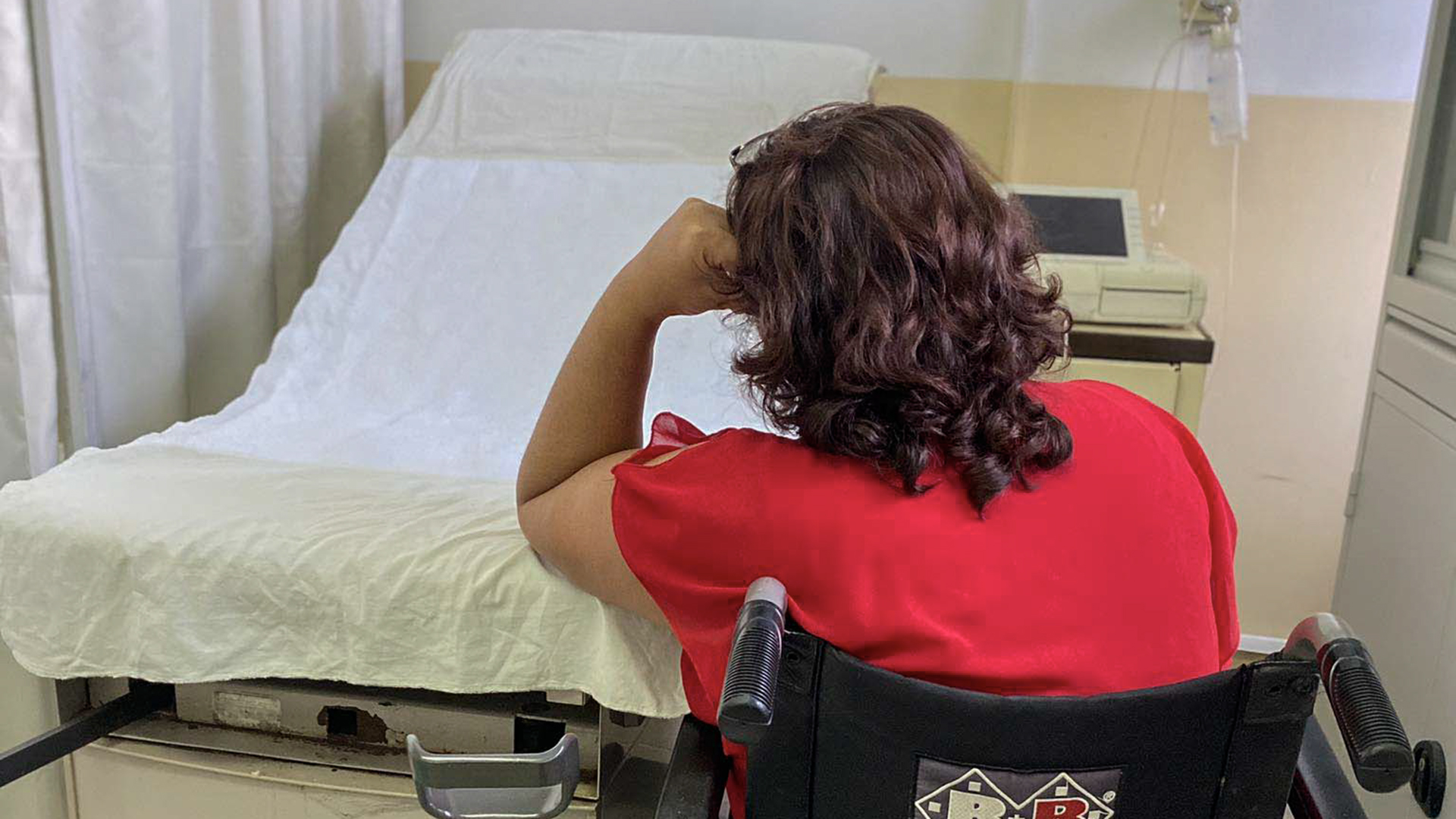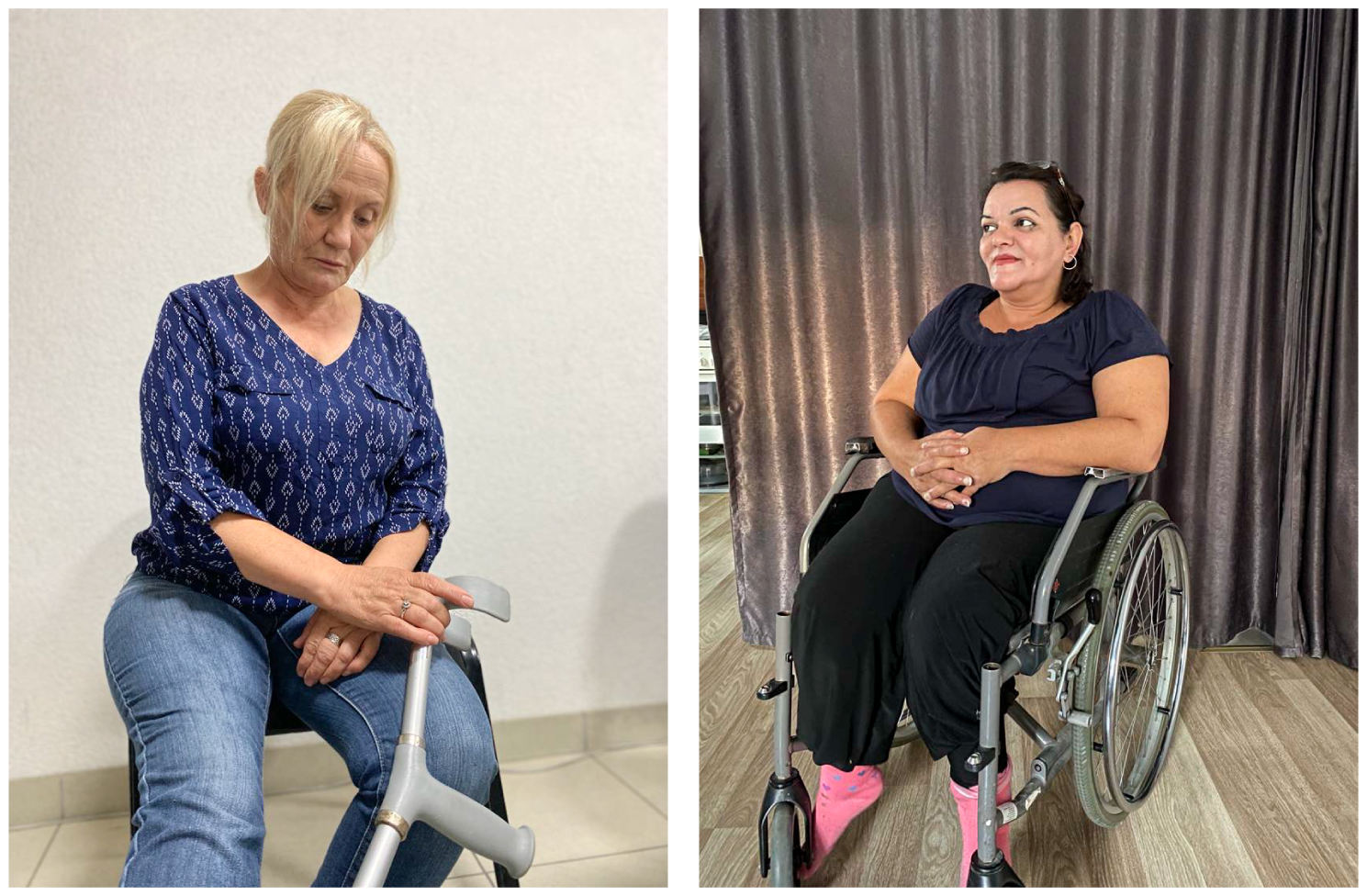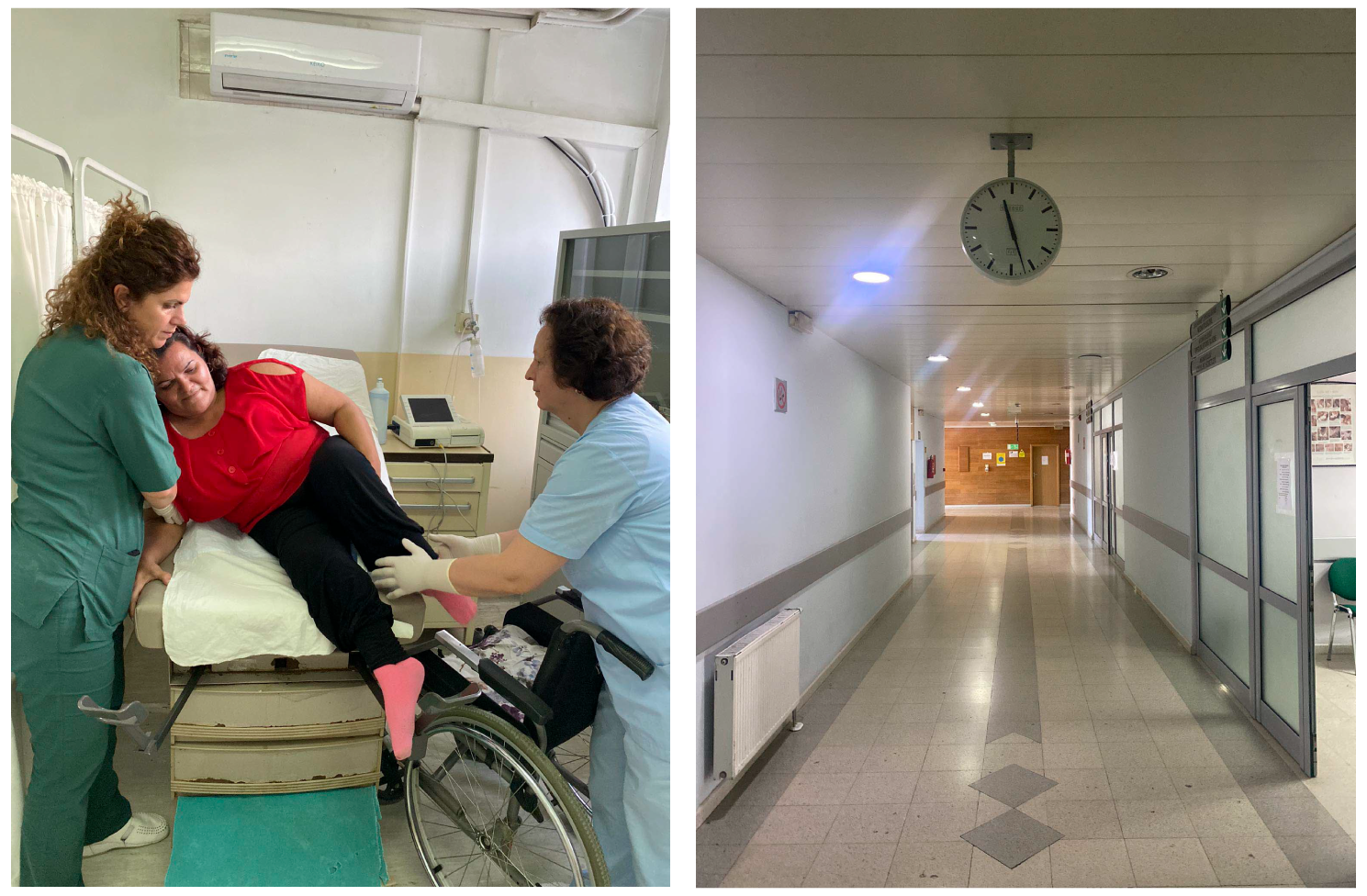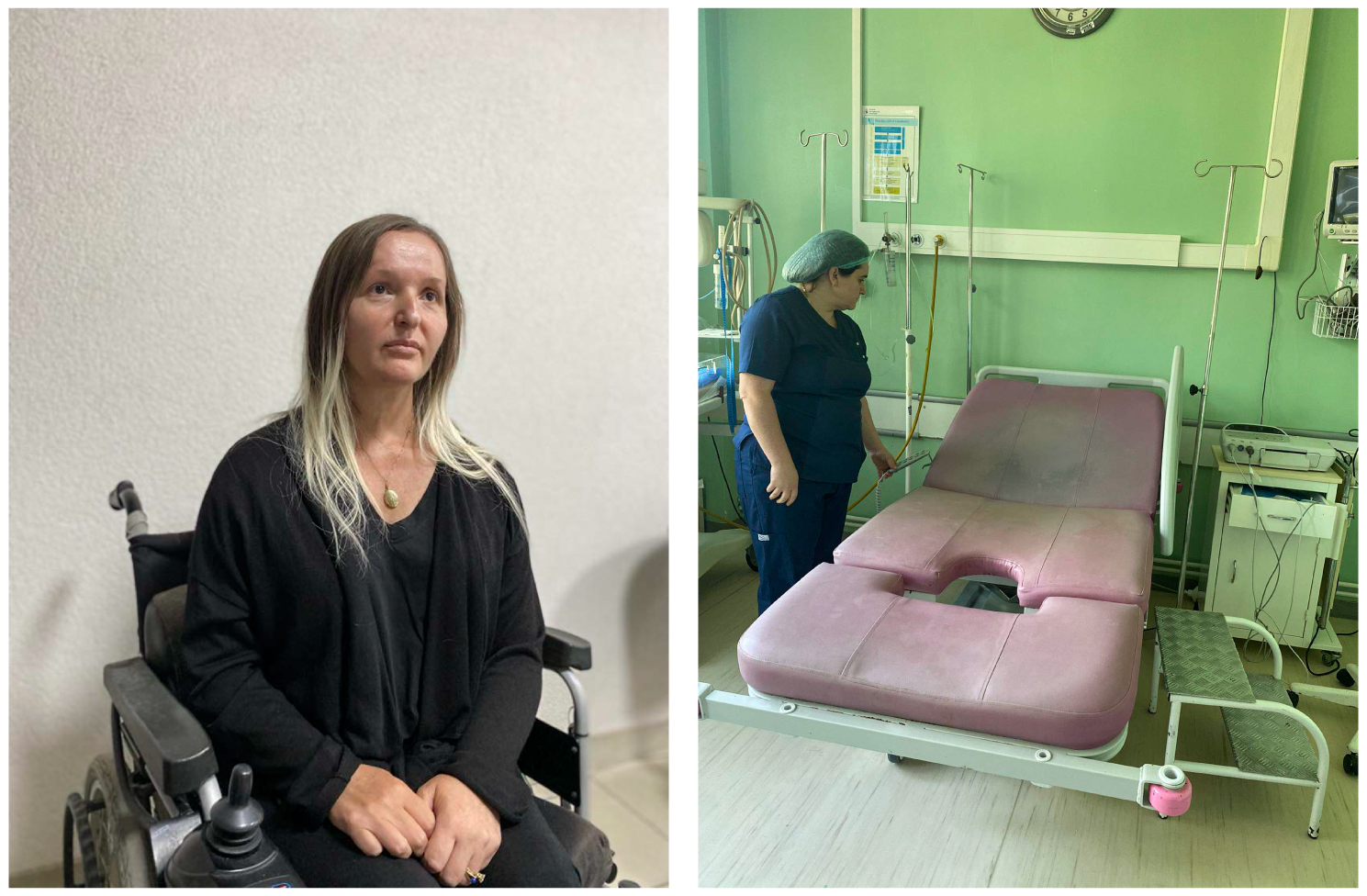
‘We are like other women’
Women with physical disabilities fight invisibility in hospitals and society.
When medical staff set a date for her Pap smear, 51-year-old Bukurije Shatri told them “Don’t wait for me.” It wasn’t due to scheduling conflicts or the examination itself, which serves to identify potential cervical diseases. Rather, Shatri, who relies on crutches for mobility, did not want to return to the hospital where she had experienced more pain than healing.
“Ma’am, undress and get up there,” the health workers had told her last time, but the high bed made her realize that a difficult task awaited her. “The Gynecologist is on the third floor, with those beds and without an elevator,” said Shatri. “I told them, I can’t. Not only because it hurts physically, but we cannot get onto these high beds. And I didn’t do it. I didn’t do the Pap smear.”
She has reduced her hospital visits, attending only when absolutely necessary. This change occurred because others have to carry her since she cannot climb the stairs. “I cannot stand it. Someone else is carrying you. This is already difficult, in itself. Even when my husband helps me with something, I say ‘I have become a burden,” she said. Now, she treats her health concerns with herbal teas and antibiotics.
The difficult experiences at hospitals has also left 43-year-old Resmije Rrahmani from Prizren afraid, leading her to avoid regular gynecological check-ups at the hospital. Her fears are unrelated to the typical tales about fearing needles or stories she has heard from others. “I hesitate because I know how those beds are, they are terrible and old. How can I go there, when the examination table is two meters high,” said Rrahmani.
Rrahmani has been living with muscular dystrophy since the age of seven and uses a wheelchair to move. She had to point this out to a radiologist during a cyst radiography procedure. “When the doctor came, he shouted at me: ‘Do you wear those shoes at your home?’ Do you lie in your bed with those shoes on? Take off your shoes,” Rrahmani recalls from her encounter with the radiologist. “‘Doctor,’ I said, ‘my shoes are cleaner than yours, because I cannot walk, I’m in a wheelchair.’”
"I couldn't [get on my feet] and so I had to go with my daughter, my niece and a neighbor, because the nurses didn't know how to hold me or what to do," said Rulani, remembering when she had to do a mammogram.
Instead of monitoring her condition and seeking advice from health professionals, Rrahmani also chooses to treat infections with herbal teas. For her, this is easier than enduring the pain and bruises she gets from being passed from hand to hand, from wheelchair to car and then back again, floor after floor.
Meanwhile, 50-year-old Lumnije Rulani from Kamenica, who has lived in Gjilan for the last few years, has refused to set foot in the gynecology ward since she became a mother 17 years ago. However, she was diagnosed with breast cancer in 2021 and uterine cancer in 2022. These diagnoses have made it impossible for her to avoid hospitals, especially private ones, which she chooses because of easier physical access.
The diagnosis of these illnesses was overwhelming for her, and it also led to more frequent medical checks and encounters with inaccessible hospitals. A routine mammogram, typically a quick check-up recommended for women of Rulani’s age, and now a necessary check-up for her, turned into an odyssey.
First, accessing the mobile clinic used to encourage early testing for women was difficult due to the lack of a ramp. After overcoming this challenge, she faced the next obstacle — the mammogram could only be conducted while standing. Rulani uses a wheelchair. “I couldn’t [get on my feet] and so I had to go with my daughter, my niece and a neighbor, because the nurses didn’t know how to hold me or what to do,” she said. Even today, she cannot do the essential mammograms for monitoring her condition.
Rulani has to go to hospitals often in order to treat her breast and uterine cancer. These visits include the University Clinical Center of Kosovo (UCCK) — where she hesitates to go. This reluctance is not only due to the inadequate infrastructure, such as high beds, but also by the health care professionals’ approach. “You can’t even imagine their facial expressions, every time you go, you experience two forms of pain: one from your illness and one from their faces, a spiritual pain,” said Rulani.
Even the nearest hospital in the city of Gjilan is far away and inaccessible. “When I went for my first checkup, the bed was very high and it took two people to lift me onto it,” said Rulani. “It made me feel bad. Because whenever we come across these problems, it is very difficult emotionally as we are always dependent on someone. This hurts.”
Women with physical disabilities encounter a daily uphill battle, facing physical and emotional pain further exacerbated by infrastructural obstacles and undignified treatment. These challenges are nurtured by institutional neglect and social inequality, creating a mountain of difficulties that can feel insurmountable — especially when seeking healing and support.
Rejected by society
Before they even arrive at the hospital, women with disabilities face prejudice and double oppression when it comes to their sexual and reproductive health. This discrimination comes from their family, social circle and society as a whole. The three women K2.0 spoke to mentioned the strong resistance from their social circle they experienced when they tried to talk about reproductive and sexual health and their plans to have children, a relationship or marriage.
Rrahmani, who is single, said that when she was younger she thought about her reproductive and sexual health, having a sex life, marriage and children. However, she abandoned these thoughts due to her condition and the societal mindset that surrounded her. “We have never spoken about it in the family, and I never freely expressed that I want to get married or something, except as a joke, which is how we treated these things. Whenever we spoke, it was only as a joke. ‘You, getting married?”” she said. On the other hand, Shatri said that when she made the decision to get married, her family told her boyfriend, now her husband, “Why did you take this invalid, only to feed her? Because she is not going to give you children.”
Women, and people with disabilities in general, face stigma regarding their romantic relationships, emotional fulfillment and sexuality. Research has widely shown that questions like “What, you?” are common and that there is a widespread social prejudice that women with disabilities do not have the same sensitivity as other women, which is not true. These attitudes can affect the lives of people with disabilities, not only when it comes to their self-perception, but can also affect more limited access when it comes to medical information and sexual health care, and can also make it harder to find partners or to start a family.
According to Rulani, these prejudices caused her romantic relationship to end. She added that she even held such negative views against herself. She said that whenever a man not in a wheelchair would approach her, she would say to him, “‘So, is this some kind of fantasy for you?’ It means I have always had prejudices against myself,” she said. But despite her doubts, she and a man she met built a relationship and planned to have children together. Rulani said that her partner’s family strongly opposed the relationship, but her ex-partner was always sure that this would not affect their relationship.
“But here you’re not allowed to by your [social] circle, the prejudices don’t leave you, and then in the end it happened,” she said. The relationship ended as soon as she was pregnant. “He came and told me, ‘you either keep the child or abort it, I don’t take responsibility, I can’t, because of my family,'” said Rulani, adding that it shattered her world.

After that, she was not even accepted by the family she grew up in. “‘If you don’t abort the child, you have no reason to come here,'” she was told after the breakup. Having decided to keep the baby, Rulani, without a roof over her head, slept for weeks in her tailor shop and then in a shelter until she managed to collect some money to rent a home for her and her daughter. “I had an income of 75 euros. I sewed sweaters and secured the rent. I worked from home because I didn’t have anyone to look after my daughter,” said Rulani.
In a context where the exclusion of women remains omnipresent, women with disabilities face double oppression. They are not recognized as having the same questions and challenges as other women, while also contending with discrimination as people with disabilities.
Luljeta Demolli, from the Kosovar Gender Studies Center, said that visibility of women with disabilities is notably low. “We have visited women before, where even the family hides them and the state’s obligation is to go door to door and to know every address,” said Demolli, adding that Kosovo’s movement for women’s rights is not sufficiently open to disabled women because of a lack of expertise. “There are few specialized organizations for this issue and it is not enough to deal with it. They do not even have the capacities and expertise to deal with their problems.”
Discrimination against women with disabilities in the context of sexual and reproductive health extends beyond private spaces to public spaces such as hospitals.
The three women K2.0 spoke to shared how the medical staff deemed them unworthy of having relationships, giving birth and failed to communicate directly with them. Instead, healthcare professionals interacted solely with their caregivers, ignoring their presence and agency.
Shatri said that she had her first two daughters while she still used a wheelchair. Since an operation she had at the age of 24 she has been using crutches. When she went to deliver her third daughter, she said the medical staff attempted to position her on her back in the bed. Lying on her back is impossible due to her condition and the surgery she had. When she tried to tell the medical staff, she said that they told her, “Come on, if you only had taken into account your condition, you wouldn’t have gotten pregnant with your third daughter.” Although she delivered her daughter many years ago, she said that the approach of health care professionals is still the same. “They look at the documents and are surprised, ‘You? Starting a family?'” she said, recalling a repeated experience.
Similarly, at her first birth, Lumnije Rulani was greeted with disbelief at the Gjilan hospital. “Oh, my god, you, pregnant? How are you going to deliver the baby, and how are you going to raise it?” This was how they welcomed her to the hospital.
As for Rrahmani from Prizren, speaking for herself about her pain has turned into a battle. “I go there for my pain, they turn to my sister. ’What’s her name, what kind of pain is she in?’… I say ‘hello, I’m here,’ I always let them know that I can speak and it’s me who is in pain,” said Rrahmani.
Amid the difficult circumstances that try to restrict their daily lives, these women again find opportunities to cultivate the courage and boldness they need to overcome these obstacles. “Women, raise your voice, don’t suffer for nothing, raise your voice and ask for your rights,” said Shatri.
Rrahmani, who said the state is not offering them support, continues to call for social solidarity. “We are like other women, we have needs, desires and feelings, like other women. We need other women to support us and the whole society,” she said, with the hope that others will see and treat them for what they are and as equal women.
Exclusionary hospitals
Another form of discrimination against women with disabilities when it comes to equal access to care for sexual and reproductive health is the lack of accessible infrastructure in Kosovo’s hospitals.
Although disability is one of the categories protected by the Constitution, and the Law on Protection from Discrimination and full and easy access for persons with disabilities is one of the principles on which the Law on Health was written, the realities and experiences of these women in hospitals are different — they are denied their rights.
One day in September, K2.0 stayed with Rulani the whole time she was trying to get in and lay down on the examination bed in the Gynecology Department at the Regional General Hospital in Gjilan. Rulani got out of the taxi only with the help of the taxi driver, who pushed her up a ramp without any side protection.
After successfully overcoming the initial challenge of entering the hospital, Rulani found herself in the examination room. She waited, preparing to ascend to the height of the outdated bed, which was covered in a green blanket riddled with holes. Gynecologist Hamide Pireci, together with a nurse, grabbed her by both arms — the only way to get her onto the bed. Rulani’s surprised face said it all. The bed in the examination room was not a hydraulic patient bed, which can be adjusted to different heights depending on the needs of the patient.
Rulani breathed rapidly to recover from the tiring mission, which had required the strength of three women. “We physically have to put them up, and physically we have to put them down,” said Pireci, who has been practicing her profession for more than 20 years.
Having to rely on someone else to get her into bed further burdens Rulani emotionally and physically. “When someone carries you, they can unintentionally sprain you. There are instances when it is easier for me to do something on my own because I know how, than have someone grab me, they don’t know how, because there are no trained people. I felt discriminated against a lot,” she said.

The Regional General Hospital of Gjilan is one of the regional hospitals of the Hospital and University Clinical Service of Kosovo (HUCSK), which have become spaces where women with disabilities do not find easily accessible services or treatment. There are a total of seven general regional hospitals in Kosovo, namely the hospitals of Peja, Gjilan, Gjakova, Prizren, Vushtrri, Ferizaj and Mitrovica. The University Clinical Center of Kosovo (UCCK) is in Prishtina. These seven hospitals are secondary level health institutions that make up HUCSK.
Among other infrastructural shortcomings, such as a lack of ramps, absence of elevators or outdated elevators, one of the most serious issues is the lack of hydraulic patient beds for gynecological and obstetric examinations. Even though this has been highlighted several times, it still has not been addressed.
At the end of 2021, the organization HANDIKOS, which aims to promote the rights and improve the living standards of people with disabilities in Kosovo, in cooperation with the Office for Good Governance in Kosovo, prepared a calendar of activities for 2022. This was the year that the Government of Kosovo declared the year of disability. The calendar contained activities expected to be carried out in 2022 by state institutions in cooperation with non-governmental organizations working to protect the rights of persons with disabilities. One of the activities was equipping hospitals with hydraulic patient beds. The institution charged to carry out this activity was the Ministry of Health (MH).
Meanwhile, HANDIKOS’ final report tracking progress on these initiatives indicates that beyond identifying that 20 beds are needed, “In 2022, no further action has been taken by the MH.”
Sanie Kiçmari, head of the Division for Citizens’ Rights in Health Care, said that the issue has remained with HUCSK. “We had a series of meetings with the director of HUCSK, now former director, who promised us that she will plan for the purchase of these beds in next year’s HUCSK budget,” said Kiçmari. “I don’t dare to think that someone is not given health services.”

In 2022, the Ombudsperson Institution of Kosovo issued an ex-officio report addressed to the institutions responsible for providing Kosovo’s citizens with access to sexual and reproductive health care. The report highlights that women with disabilities encounter a range of difficulties within health institutions and are often discriminated against because of their disability. The Ombudsperson recommends that HUCSK undertakes “immediate action for the purchase of adequate chairs, beds for gynecological checks and giving birth for persons with special needs in obstetric gynecological clinics and for all regional hospitals in the country.”
When K2.0 contacted the Office of the General Director of HUCSK, Elvir Azizi, to inquire about the status of purchasing hydraulic patient beds, the office responded with “Contact the regional hospitals.”
However, the regional hospitals still do not have hydraulic patient beds. Prizren Hospital Medical Director Hasan Arzaollxhiu said that in the hospital he runs “there is no difference between patients, those who do not have specific needs, or between those who have specific needs.” He also said that the elevators are outdated, but they still work. “We are in the phase of changing the two key elevators for accessing both the surgery and gynecology departments,” he said.
Meanwhile, Resmije Rrahmani, who calls the beds “terrible and old,” said that whenever she was in pain, access to the hospital in Prizren was always difficult. “Either the elevator doesn’t work, or there is no equipment,” she said.
Arzoallxhiu, despite saying that he is aware that the beds are static and the elevators are outdated, said that he has never received requests from the gynecology and obstetrics departments, or official complaints from women with disabilities who have not received the health services they requested.
Below Arzoallxhiu’s office, is the gynecological outpatient clinic in the Prizren hospital. On that Monday in September, Gresa Kastrati, a nurse, was on shift, who, similar to Dr. Pireci from Gjilan, showed that women with disabilities are helped to get in the beds. “A disabled woman cannot lie down in bed for examinations,” said Kastrati, adding that medical personnel help them.
The same happens in the hospitals of Mitrovica and Ferizaj. “It is also very difficult for us, but we do not have better conditions and we got used to helping them. We help each other,” said Vjollca Çitaku, gynecologist at the Mitrovica Regional Hospital.
Gynecologist Minere Aliaj from the Regional Hospital of Ferizaj said that due to infrastructural difficulties, they choose not to force women with disabilities to put them to the high beds for the gynecological examination, but place them in ordinary hospital beds. “We absolutely do make them go up on the table [for a gynecological examination]. Of course it is difficult for the staff, but that way the patient is more comfortable,” said Aliaj.
Despite the apparent challenges in accessibility at the regional hospitals, director of the Gynecology Clinic in Prishtina Zef Ndrejaj said that they have enough hydraulic beds. “There is no problem in their gynecological treatment,” said Ndrejaj in response to K2.0.
However, the examination rooms tell a different story. In the Admission and Specialist Outpatient Clinics in the Gynecology Hospital at UCCK, although the beds look like hydraulics, according to a visit to the examination room by one of the health workers, the beds did not lower enough for women with disabilities.
Xhejlane Xhaka, head nurse of the Gynecology Department at UCCK also said that the last time a woman that moves with a wheelchair visited, the physical strength of the medical staff was needed to to get her on the examination table. “We had a case 10 days ago where a patient was in a wheelchair and couldn’t move, and it took about 10 people to carry her onto the table [for] gynecological examinations,” said Xhaka.
Bukurije Shatri said that when she was of two minds about whether to do the Pap test, due to the difficulties in getting into the bed, a health worker told her "If you think you cannot, then go to a private hospital."
Being picked up by staff, which seems to have become the only way disabled women can get onto the bed for examinations, is painful on many levels. “Being carried by other people is very painful and very hurtful,” said Resmije Rrahmani. “I avoid being carried too much, because every day they carry me from my wheelchair and each time I get injured. Now, just imagine being placed in a two-meter-high hospital bed and being touched or hurt, it’s very sensitive and scary for me, because the bruises remain for weeks.”
These intimidating circumstances mean that these women avoid hospitals and consequently miss regular gynecological check-ups. While there are no specific figures, across all hospitals medical staff highlighted the infrequent gynecological visits by women with disabilities. Regular gynecological check-ups are recommended at least once a year to maintain health and ensure the early diagnosis of potential diseases related to the pelvis, reproductive system and sexual health. Gynecological health services are limited for women in general, coupled with a general stigma, both socially and within hospitals themselves. Women with disabilities face double discrimination, both due to their gender and disability.
All three women K2.0 spoke to have experienced this discrimination, either in the accessibility or in the approach of health personnel. Also, many similar experiences are evident in the Ombudsperson’s report.
These obstacles have pushed women with no other options towards private hospitals, which, according to them, are more accessible in terms of infrastructure. Even the approach of health personnel in public hospitals has played a significant role in this. Bukurije Shatri said that when she was in two minds about whether to do the Pap test, due to the difficulties in getting into the bed, a health worker told her “If you think you cannot, then go to a private hospital.”
Shatri and other women with disabilities can hardly consider going to private hospitals in a context where people with disabilities are more exposed to poverty. This is due to discrimination in employment, the pension system and the poor financial compensation they receive. A visit to a private hospital costs around 20-40 euros and can be much higher depending on the examinations required. Women with disabilities receive between 100 and 150 euros, depending on their diagnosis, the evaluation group to which they belong and by which law determines their compensation. Two fundamental laws in this regard are the Law on the Status and Rights of Persons with Paraplegia and Tetraplegia and the Law on State-Funded Pension Schemes.
Compensation for people with disabilities is regulated through a number of laws.
Based on the Law on the Status and Rights of Persons with Paraplegia and Tetraplegia, people with disabilities receive a monthly payment of 150 euros, while their caretakers receive a payment of 150 euros and in certain cases 75 euros for other health equipment. This only applies to the first group according to the assessment made by the Medical Commission. Meanwhile, those who are categorized in the second group, only receive 150 euros.
Based on the Law on State-Funded Pension Schemes, people with disabilities received a disability pension of 75 euros until 2022, when this pension, which is the same as the basic pension, was increased to 100 euros in line with the Government’s decision. This law also provides for the invalidity pension.
Meanwhile, the rights of blind people in compensation are provided by the Law on Blind Persons.
Despite the fact that there is clear evidence and established inadequate conditions for women with disabilities through reports and conversations with these women. However, hospital representatives, including those from the MH, assert that they have not received any official complaints about a lack of access to services for this demographic.
The MH, although it has its own online complaint system for citizens regarding general health services, Kiçmari said that they have never received anything specific from women with disabilities. However, the MH does not categorize complaints and gathers them all in one place. In addition, none of the interviewed women are aware of the very existence of such a system of complaints, nor have they complained formally. “And how can we complain, when we can’t even go to the doctor on our own, when we don’t have any other choice but to depend on others?” asked Rulani.
For her, even the expectations to complain are overwhelming, mirroring the institutional inaction and silence which strip her and other women with disabilities of their dignity, equal access and above all, their right to be visible.
Feature Image: Kaltërina Misini / K2.0
This article is part of the Human Rightivism project, which is funded by the Embassy of Sweden in Prishtina, implemented by the Community Development Fund through its Human Rightivism Program. The views expressed in it do not necessarily reflect the views of the Embassy of Sweden in Prishtina.
